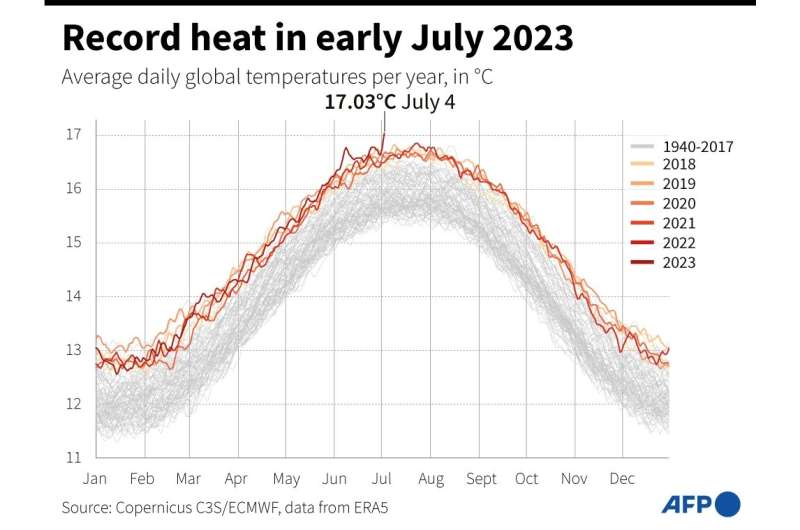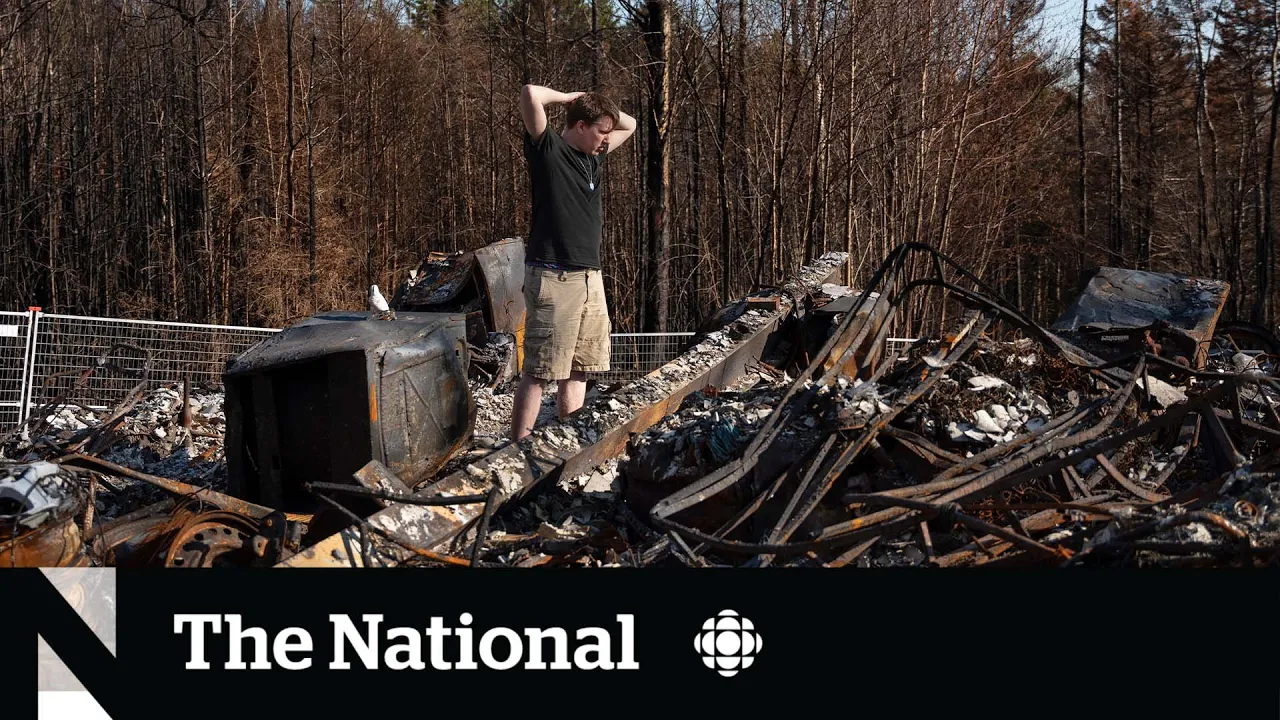Worldwide Extreme Weather is off the Charts
It has been seven days with global average temperatures clocked in as the hottest days in an estimated 120.000 years.
It has been seven days with global average temperatures (preliminary data) clocked in as the hottest days in an estimated 120.000 years.
World daily temperature records smashed
Phys.org: The University of Maine has established an online tool called Climate Reanalyzer, which shows the curves of average global temperature for each day since 1979.
On Monday July 3, this curve reached a high of 17.01 degrees Celsius (62.62 degrees Fahrenheit). That record was surpassed on Tuesday with 17.18C (62.92F), and again on Thursday with 17.23C (63.01F).
Europe’s Copernicus Climate Change Service, which has a similar tool, later confirmed the records of Monday, then Tuesday, albeit with slightly different figures—16.88C (62.38F) and 17.03 (62.65F), respectively.
[..]“These are estimates, unofficial records,” University of Maine climate scientist Sean Birkel, who developed Climate Reanalyzer, told AFP.
“The greatest emphasis should be placed on an annual and monthly timescale,” he added, with these reports subject to greater checks and verifications than is possible for daily records that rely on near real-time information.
On Thursday, Copernicus separately released its analysis for the past month, announcing it was the hottest June on record.

Floods in the U.S.
One contributor to the devastating floods in the Northeast is its very slow moving. That’s due to (again) a very strong high latitude block over Greenland. It’s an atmospheric traffic jam… the NE storm is stuck behind it. It’s likely partially a symptom of climate heating… pic.twitter.com/8Yu5jIGV1j
— Jeff Berardelli (@WeatherProf) July 10, 2023
India
UN says climate change ‘out of control’ after likely hottest week on record
The Guardian: For the seven-day period ending Wednesday, the daily average temperature was .04C (.08F) higher than any week in 44 years of record-keeping, according to the University of Maine’s Climate Reanalyzer data.
“We recognise that we are in a warm period due to climate change, and combined with El Niño and hot summer conditions, we’re seeing record warm surface temperatures being recorded at many locations across the globe,” NOAA said.
[..] “Temperatures have been unusual over the ocean and especially around the Antarctic this week, because wind fronts over the Southern Ocean are strong pushing warm air deeper south,” said Raghu Murtugudde, professor of atmospheric, oceanic and earth system science at the University of Maryland and visiting faculty at the Indian Institute of Technology, Mumbai.
Climate change is reaching uncharted territory and that the increased heat from anthropogenic global heating combined with the return of El Niño would lead to more record-breaking temperatures.
The UN confirmed the return of El Niño, a sporadic weather pattern, on Tuesday. The last major El Niño was in 2016, which remains the hottest year on record.
“Chances are that the month of July will be the warmest ever, and with it the hottest month ever … ‘ever’ meaning since the Eemian [interglacial period], which is indeed some 120,000 years ago,” Dr Karsten Haustein, a research fellow in atmospheric radiation at Leipzig University, said.
Chari Vijayaraghavan, a polar explorer and educator who has visited the Arctic and Antarctic regularly for the past 10 years, said global warming is obvious at both poles and threatens the region’s wildlife as well as driving ice melt that raises sea levels.
See some of the extreme weather events from around the world.
Exceptional heat wave in North Africa:
Widespread Temperatures between 45C and 50C even near the coast, nights 30C/35C and even close to 40C.Today brutal heat again in Tunisia with the hottest July day on records at Kairouan with 48.4C.
Bizerte on the coast with 45.8C. pic.twitter.com/aSajVwDnFv— Extreme Temperatures Around The World (@extremetemps) July 8, 2023
Meanwhile in Canada, wildfires ‘off the charts’ as temperatures climb. There are currently over 670 blazes—more than 380 of them out of control— a long and difficult summer is ahead.
Wildfires ‘off the charts’ in Canada as temperatures climb
Phys.org: Weather forecasts for the coming weeks predict above-average temperatures in many parts of the country in the west, and also in northern Quebec, the worst-hit region.
With nine million hectares (22.2 million acres) already gone up in smoke—11 times the average for the last decade—the absolute annual record set in 1989 has been surpassed.
Authorities tallied 677 active fires in the country on Friday (with 13 new blazes discovered during the day), including 386 that were burning out of control.
Some 155,000 people have been forced to leave their homes at some point due to the fires since the beginning of May, the highest figure for 40 years.
“It’s no understatement to say that the 2023 fire season is and will continue to be record-breaking in a number of ways,” Norton said, adding that he expected the number of fires to remain above average throughout the summer.
The fires ravage areas on both sides of the country, and areas unaccustomed to fires are affected.
One of the forest fires in northern Quebec alone burned more than one million hectares.
“From evacuations to poor air quality and extreme heat warnings, we are experiencing the reality of climate change effects,” Health Minister Jean-Yves Duclos said.
El Niño
Historically, this is the time of the year we should really start to see the effects of El Niño on global Sea Surface Temperatures.
But there is no historic precedence of what's happening now. pic.twitter.com/XRbDi23YvD
— Leon Simons (@LeonSimons8) July 10, 2023
Um, this chart is from @BMcNoldy at the Univ of Miami. It shows incredibly hot–almost hot-tub hot–ocean water.
He said: "I'm not sure I've ever seen the water around Florida look like this…at any time of year." pic.twitter.com/urUq1nE13u— Bill McKibben (@billmckibben) July 9, 2023
»Dear friends, scientifically, this is not a #ClimateCrisis. We are now facing something deeper. Mass extinction. Air pollution. Undermining ecosystem functions. Really putting humanity’s future at risk. This is a #PlanetaryCrisis.«
— Professor @jrockstrom,
director @PIK_Climate pic.twitter.com/Afq4qol7Wl— Michael Flammer #KlimaVor8 (@Jumpsteady) July 10, 2023
